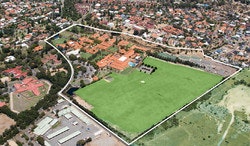Religious Education - Year 10
Course Description and Outline
As Course Selection for Year 11 occurs in Year 10, it is worthwhile noting that the Religion and Life ATAR pathway is strongly encouraged for any student intending to take the ATAR pathway in his or her other chosen Learning Areas. Religion and Life as a tertiary pathway has been very successful at John XXIII College with a high majority of students using Religion and Life in their top 4 scoring subjects for University Entrance.
In Year 10 students learn the Christian values that Jesus taught and how these values can be lived by Christians today. As the students prepare for course selection and career pathways the RE content investigates the Christian vocation and recognise what is taught about the need to discover personal vocation. The perennial concept of authentic human freedom is also explored. In Second Semester, students explore the rudiments of Catholic Moral Theology and its practical application in today's world, a brief overview of Church history, the formation of conscience and the Catholic Social Doctrine highlighting the College's motto of "Seeking Justice". It dovetails well with the Christian Service component of the College curriculum and the Pilgrimage Experience which some students will seek to endeavour. Students will be challenged to explore a variety of spiritual, moral and social issues through the following topics:
TERM 1: VOCATION "Called to Be and Become"
- The basic human vocation
- Discovering personal vocation
- The Christian vocation
- Marriage is a vocation
- Ministerial priesthood is a vocation
- Religious life is a vocation
- Life Everlasting
TERM 2: FREEDOM
- Freedom to make responsible moral choices
- How people can know if their choices are morally good
- God begins to restore human freedom
- God revealed the Old Law
- Jesus gave the New Law of Freedom
- The New Law of True Freedom
- The Sacraments of True Freedom
TERM 3: CONSCIENCE & CHURCH HISTORY
- Conscience - alone with God
- Making judgements of conscience
- The four principles of conscience
- Challenges to recognising the voice of conscience
- Jesus promised the Holy Spirit to guide conscience
- The characteristics of the Church
- The growth of the Church
- The renewal of the Church through the Holy Spirit
TERM 4: JUSTICE
- God created in people a concern for justice
- Human injustice in the world
- Jesus - the realisation of God's justice
- Jesus restores justice in people's hearts
- Jesus calls Christians to promote social justice
- The Church promotes social justice
Assessments
This course is Skill-based with individual and group assessments. There are a variety of tasks to challenge the students as they strive to demonstrate their understanding of the Topics covered. The following types of assessments and weightings is as follows:
Topic Tests: 20% | In class Essays: 20% | Investigation: 25% | Examinations: 40%
Topic tests includes source analysis and short answers. Investigations may include research-based assignments, detailed reports, oral and audio-visual presentations using ICT. All students will sit an examination at the end of both semesters.
Reporting
An interim report on class work and behaviour will be issued towards the end of Term 1. The achievement for the unit will be reported as a College A - E grade. In addition, the student's approach to class work and behaviour will be reported via the usual key performance indicators.
Student Expectations - Homework
Students will be expected to complete approximately 120 minutes of homework each week. This time should be spent consolidating material covered in class as well as any assigned tasks.
